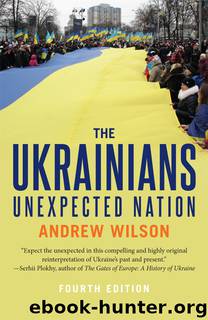The Ukrainians by Andrew Wilson

Author:Andrew Wilson
Language: eng
Format: epub
ISBN: 9780300154764
Publisher: Yale University Press
A ‘Post-Colonial’ Ukraine?
To many Ukrainians, Ukraine’s current cultural plurality is an artificial reflection of the ‘post-colonial’ condition depicted by Edward Said, Franz Fanon, Homi Bhabha and others.22 According to Ukrainian critics such as Roman Kis, Mykola Riabchuk and the diaspora author Marko Pavlyshyn, this has left Ukraine awkwardly ‘in medias res’,23 with one eye on domestic culture and the other on Russia. Ukraine has yet to liberate itself from the spell of the former metropol and the inferiority complex of the forcibly provincialised (in the words of Natalka Bilotserkivets’s poetic lament, ‘we’ll not die in Paris I now know for sure’).24 Ukrainian language and culture are still stigmatised by many Ukrainians (the writer Volodymyr Bazilevskyi has defined this as ‘Ukrainophobia amongst Ukrainians’),25 who still identify ‘higher’ or transcendent culture with Russia. Modern popular culture (pulp novels, pop music, game shows) is also more often obtained from Russian (or American) sources. According to Mykola Riabchuk, a form of ‘creole nationalism’ dominates amongst Russophone Ukrainians, which ‘in political terms … is quite “Ukrainian”, i.e. quite supportive of state independence, territorial integrity and many historical myths and symbols shared with Ukrainophones. In cultural and linguistic terms, however, it is rather “Russian” in nature, i.e. unsympathetic to Ukraino-phones (with their alleged “western Ukrainian nationalistic obsession”) and is thoroughly biased against the Ukrainian language and culture’26 which it continues to regard as a low-status, peasant culture. Ukraine may be politically independent, but its psychological and cultural freedom can only be won by deconstructing the idea of empire, which still ‘deforms our national space from within’.27
The tenacious grip of Russia on the Ukrainian psyche is the subject of the 1993 novel by Yurii Andrukhovych, Moskoviada (The Last Days of Moscow), which sought to continue the task begun by Shevchenko and Khvylovyi of deconstructing the myth of Moscow and its ‘metropolitan discourse’. The narrative therefore has many deliberate and playful echoes of Shevchenko’s poem The Dream (very postmodern – a parody of a parody, Shevchenko’s work having been a rival to Pushkin’s The Bronze Horseman). Whereas the ‘New Literature’ movement, founded by Yevhen Pashkovskyi with a similar purpose in 1993, attacked all Soviet Ukrainian art as imbued with a foreign spirit, Andrukhovych’s novel is more honest about how this culture was internalised. His anti-hero symbolises Ukraine’s ‘post-colonial’ malaise. Moscow is a dreadful place, but he is constantly drawn back to it and hates himself for the weakness in his character that allows him to be so fatally attracted.28 Moscow the city still has a huge Ukrainian population – from artists to building workers – but the real point is that Moscow is also psychologically present in Ukraine. As in Chekhov’s provincial study Three Sisters, ‘To Moscow!’ is still the dream.
Ukraine therefore still has a disoriented and profoundly split personality. Oksana Zabuzhko, in her novel Field Notes on Ukrainian Sex (1996), is constantly tired of her ‘non-being in this world’, of homelessness, of always being asked ‘Ukraine – where is that?’ She fears that only her children will finally be free of such complexes: ‘slaves’, she declares, ‘should not have children’.
Download
This site does not store any files on its server. We only index and link to content provided by other sites. Please contact the content providers to delete copyright contents if any and email us, we'll remove relevant links or contents immediately.
| Africa | Americas |
| Arctic & Antarctica | Asia |
| Australia & Oceania | Europe |
| Middle East | Russia |
| United States | World |
| Ancient Civilizations | Military |
| Historical Study & Educational Resources |
Underground: A Human History of the Worlds Beneath Our Feet by Will Hunt(11264)
Navigation and Map Reading by K Andrew(4556)
Sapiens by Yuval Noah Harari(4548)
Barron's AP Biology by Goldberg M.S. Deborah T(3634)
The Sympathizer by Viet Thanh Nguyen(3506)
5 Steps to a 5 AP U.S. History, 2010-2011 Edition (5 Steps to a 5 on the Advanced Placement Examinations Series) by Armstrong Stephen(3406)
Three Women by Lisa Taddeo(2924)
The Comedians: Drunks, Thieves, Scoundrels, and the History of American Comedy by Nesteroff Kliph(2792)
Water by Ian Miller(2595)
Drugs Unlimited by Mike Power(2195)
DarkMarket by Misha Glenny(1849)
The House of Government by Slezkine Yuri(1846)
The Library Book by Susan Orlean(1738)
A Short History of Drunkenness by Forsyth Mark(1731)
Revived (Cat Patrick) by Cat Patrick(1679)
The Woman Who Smashed Codes by Jason Fagone(1650)
The House of Rothschild: Money's Prophets, 1798-1848 by Niall Ferguson(1620)
And the Band Played On by Randy Shilts(1619)
Birth by Tina Cassidy(1572)
